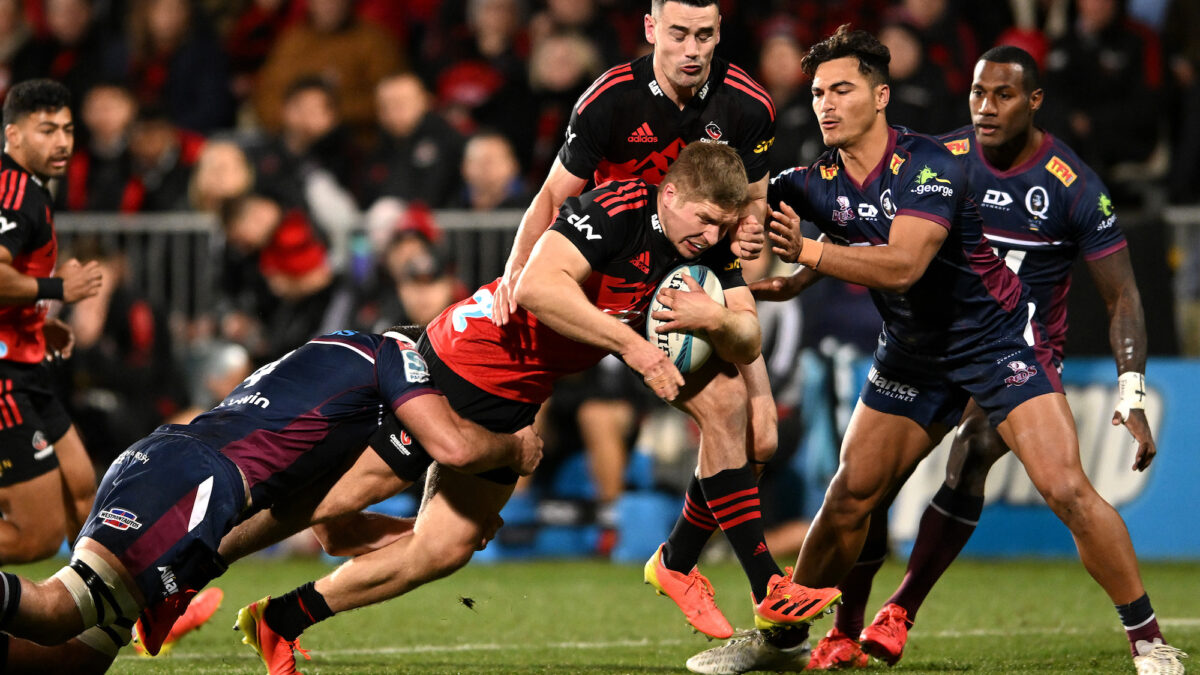
It’s been pointed out ad nauseam that having eight teams qualify for the finals from a 12-team competition is farcical.
And with the top four seeds duly confirming their place in next week’s semi-finals, a common cry across social media was ‘we told you so, why bother?’
At face value, their premise is right. Finals should be reserved for winning teams that have a genuine shot at the title, not also-rans with a 4-10 season record, with half of those wins being against competition rookies.
But for other – more important – reasons, the premise is wrong. Rugby in this corner of the world walks a commercial precipice. When broadcast partners demand a full week of quarter-finals, it’s an easy decision to comply. A precipice, you could say.
And despite the predictable results – clear wins to the top three seeds, and a dogfight between sides four and five – quarter-final weekend delivered terrific value, including an opportunity for fans to see which players could make the step up to the higher level of intensity that finals invariably bring.
To that end, players like the Brumbies’ Tom Hooper, the Blues’ Stephen Perofeta and the Highlanders’ Folau Fakatava made significant strides. Each of them were good players already, but thrived when placed under a more intense spotlight.
Scoreboards can be misleading at times. The Reds, 37-15 losers to the Crusaders, were far more combative and competitive than in their 28-15 loss to the same team the week before.
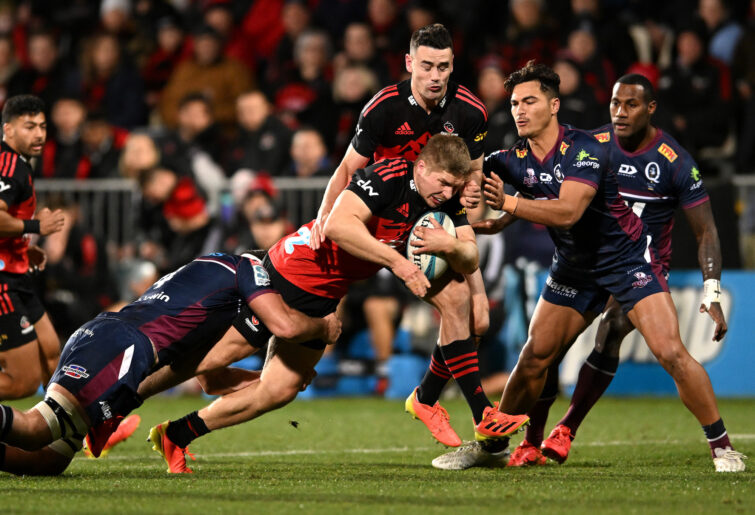
(Photo by Joe Allison/Getty Images)
This was despite their scrum being monstered in the first 50 minutes, skill errors and an inability to punch through the gain line meaning they were unable to control possession over multiple phases, and place enough concerted pressure on their hosts.
But there were promising shoots, greener than any seen over the last six weeks. Reward came via two sharp tries to their wingers, and while the Reds’ season has been on a slide since their win against Brumbies in Round 7, captain Liam Wright was correct to say afterwards that there was something of value to take forward into the off-season.
The Crusaders’ first-half dominance was built around their ability to recycle at warp speed, so fast that the try to Will Jordan was a situation where it was practically impossible for the Reds (or any) defence to reset and stop.
As the dust settled on Friday night it was shaping like a bad weekend for All Blacks coach Ian Foster, with the impressive Ethan Blackadder suffering a serious shoulder injury, and Blues captain Dalton Papalii being ruled out of rugby for an unspecified time.
By Saturday morning, it was confirmed that Papalii had suffered appendicitis; no fun for him, but not the kind of thing to keep him out long term.
And Foster’s All Blacks loose forward stocks were being further bolstered by Luke Jacobson tormenting the Waratahs, carrying forcefully, as if he was demanding selection for the All Blacks’ upcoming series against Ireland.
With Jacobson leading the Chiefs across and through the gain line, those post-contact metres paved the way for a comfortable 39-15 win.
Having beaten the Crusaders already this season, the Chiefs will head to Christchurch without fear. Perhaps their biggest work-on this week will be Quinn Tupaea learning that rubbing the head of an opponent after a try achieves nothing more than marking you as a dickhead.
A lot of what the Waratahs did was good. Very good. Sam Harris streaking 60 metres at full pace for a thrilling transition try was excellent. So was the breakdown work of winger Dylan Pietsch.
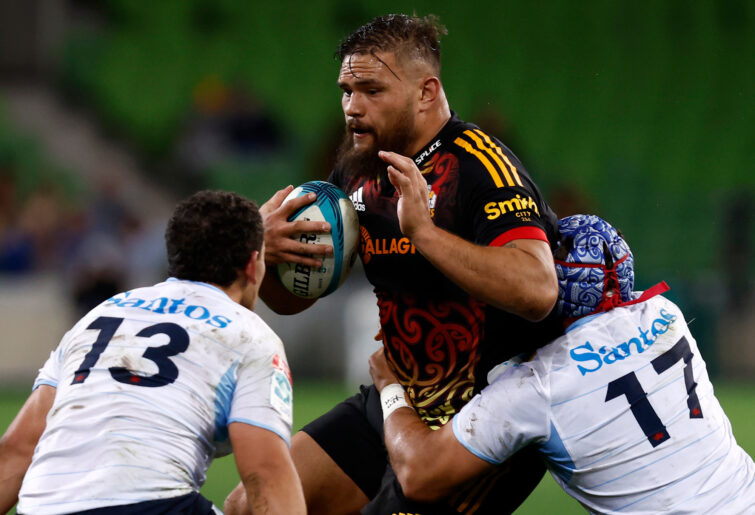
(Photo by Darrian Traynor/Getty Images)
But too much of what they did was less than good. Poor, even. A naïve attempt to run the ball out from their goal-line in the first half gifted a try. There were 14 handling mistakes, many of them unforced. They conceded the collision zone. Tane Edmed’s goal kicking was wayward.
None of that takes away from what has widely been acclaimed as an excellent season. Giant strides have been made and it feels like there is a now a strong base in place from which to go to the next level.
Darren Coleman, Jed Holloway, Jake Gordon, Angus Bell, Izaia Perese and Michael Hooper are all important, top-shelf names, with many others just a whisker below them, still on the improve.
In Auckland, the Highlanders were up for the fight in the first quarter, adapting quicker to the slippery Eden Park surface, and putting heavy pressure on the Blues’ scrum, albeit never really convincing that they had the back-line power or finesse to make it hurt on the scoreboard.
The Blues stayed calm and looked to have broken the game open with a try to Akira Ioane, but his lunge for the line was enough only to provide TMO James Leckie with the opportunity to demonstrate his interpretation of the term ‘conclusive proof’.
Perhaps Leckie’s attention was diverted, picking up Highlanders hooker Andrew Makalio in the run-up play recklessly throwing his shoulder into Tom Robinson, leaving referee Angus Gardner with no option but to send him off.
Bizarrely, Makalio seemed to find the whole business amusing. It’s doubtful his coach Tony Brown enjoyed the joke quite as much.
Better fun was had by Josh Dickson pulling off the most outrageous of steals from the back of a threatening Blues maul. But, at the half hour, the Blues finally manufactured space for Ioane, this time offering conclusive proof of grounding, even if his post-try celebration was a fizzer.
Beauden Barrett sliced through the same channel minutes later, and the Blues were suddenly ahead by 14-6, and on their way.
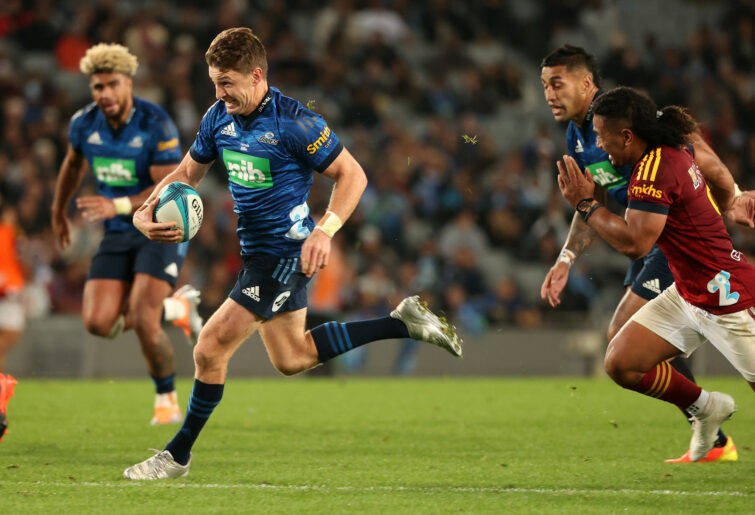
(Photo by Fiona Goodall/Getty Images)
In other loose forward news of interest to Ian Foster, the individual battle between Hoskins Sotutu and Marino Mikaele-Tu’u was worth the price of admission on its own. Ioane grew increasingly dominant as the match wore on, and after a long stint on the sidelines, Shannon Frizell returned off the bench looking hungry and strong.
The final score of 35-6 felt about right, but the Blues will know they face a far different style of match next weekend.
They are a side that likes to impose their attacking style on the opposition, but if they try to do this without first combating the heat that the Brumbies will bring to the breakdown, they will be in for a torrid night.
Debate has raged long and hard in New Zealand about the suitably of Rieko Ioane for centre, versus his undoubted appeal as a winger.
Let the record state that Ioane threw the last pass for three of the Blues’ tries, each of them a mini-masterpiece in his ability to recognise where the space was and pass before taking contact.
Simple perhaps, but only made to look simple by Ioane’s pace and soft touch. Coming on the same weekend when Jack Goodhue found himself out of position against Jordan Petaia and unable to make up lost ground, Ioane looks certain to start against Ireland with 13 on his back.
The icy, polar blast formerly known as winter made for an unfriendly Canberra welcome for the Hurricanes, who defied the conditions with an exhibition of outstanding handling and ball retention.
Unfortunately, matches are not won on those measures alone, and even when the impressive Josh Moorby ghosted through a gap for a well-deserved seven-point half-time lead, it didn’t feel like enough.
After being touched up last week, and given another reminder at the break, the Brumbies lifted their intensity, scrapped hard at the breakdown, and fed off their trusty maul.
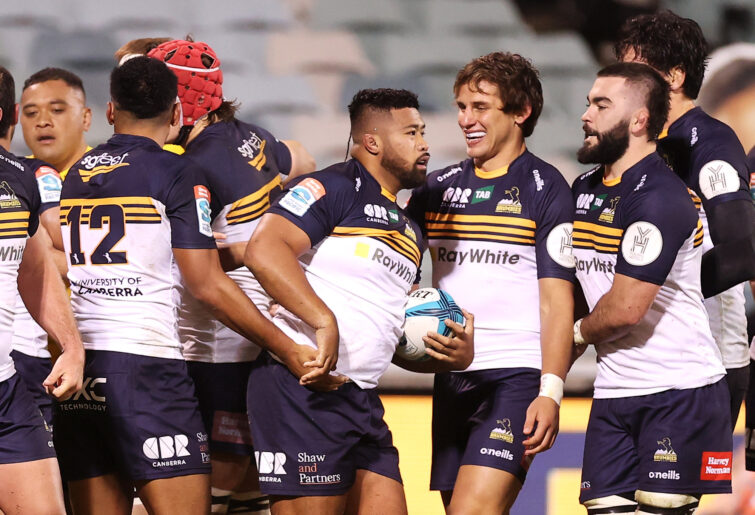
(Photo by Mark Kolbe/Getty Images)
This was Brumbies DNA under Dan McKellar writ large, and another reminder for Ireland – as if they need it – that the best way to stop New Zealand sides playing you off the park is to be abrasive and get under their noses.
The Brumbies drew energy from the efforts of Tom Hooper, then from their bench. Nick Frost, Lachlan Lonergan and Ollie Sapsford were all prominent in Tom Banks’ go-ahead try in the 64th minute.
By contrast, there was a sense that Hurricanes’ coach Jason Holland emptied his bench too early, and while coaches like to spruik the line that all 23 squad members are equal, in an elimination final you need your best players on the park when the championship minutes are up for grabs.
A few minutes of card madness in the first half bought the usual indignation and frustration. Len Ikitau saw red and Owen Franks yellow for high contact on Aidan Morgan and Noah Lolesio respectively.
No two circumstances are ever identical, but the Canberra crowd’s unrest at seeming inconsistency was understandable.
In striving for the consistency everyone asks for, World Rugby has elected to use initial point of contact as the main determinant of further action.
Accordingly, objective process and frameworks are important, otherwise subjectivity and the vibe takes over. And with every individual having a different feel for what that vibe is, confusion and dissension would run rampant.
The current decision-making process is thus useful to a point, but it contains two important flaws. Firstly, it requires referees to determine the point of contact on-field, working off low-definition stadium screens, often taking into account single dimensions only.
In these situations, it is easy to be overly influenced by the sight of a player’s head snapping back – often due to the physics of momentum as opposed to actual direct, forceful contact to the head.
Secondly, a too-rigid decision-making framework can override plain logic, and doesn’t provide for a referee to apply common-sense application.
Nowhere was this better illustrated last week, by the uproar over Pablo Matera escaping suspension for his tip tackle on Jordan Petaia, while the Highlanders’ Sam Gilbert sits out five weeks for his tip on Michael Hooper.
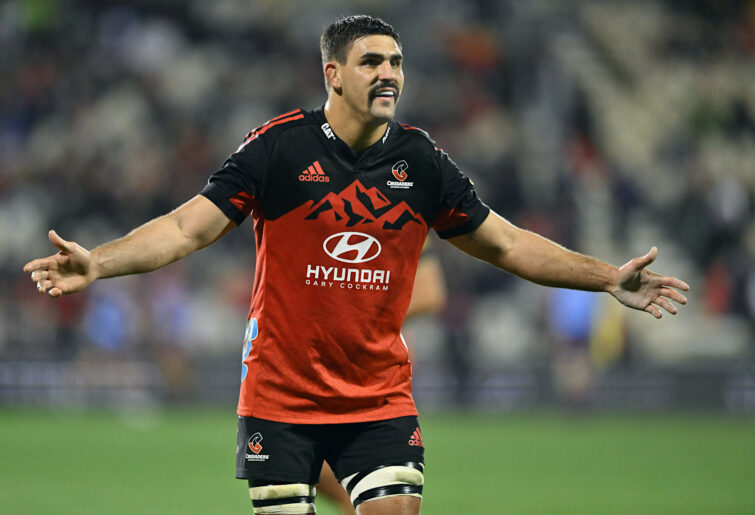
(Photo by Kai Schwoerer/Getty Images)
The respective referees were 100 per cent correct in their law application with respect to the point of contact, but any logical read suggests that the variance in the sanctions is nonsensical.
In this weekend’s incidents, Franks could consider himself lucky, on the basis of a marginal determination that initial contact was made with Lolesio’s shoulder, before his head.
Conversely, Ikitau can consider himself unlucky that the same determination wasn’t made for him, when – based on some angles – there was a strong argument for initial contact being with Morgan’s shoulder.
If that all sounds and feels like hairs are being split, that’s because they are. A far more equitable solution is to retain full red cards for obvious, serious cases of foul play.
But where there is any doubt, to apply a yellow card and have those cases sent to the judiciary for more sober, detailed analysis, using higher quality audio-visual equipment than the referee has at his disposal during a match.
All backed by harsher suspensions, if and when players are found guilty, so as to maintain the an effective deterrent effect.
All of that said, these arguments and discussion points around relativity and precise points of contact are at the margin, and are not the real issue. Minimising contact to the head is.
And the fastest and easiest fix is for players to learn not to enter contact in an upright position, and control their actions.
No coach wants to be the first to insist upon de-programming his players and undoing all they have learned by having them all tackle low, only to be embarrassed when his side is torn to shreds by an opposition having a field day offloading at will.
But they might as well bite the bullet and get on with it, rather than die the death of a thousand cuts. They’ll all be doing it soon enough.